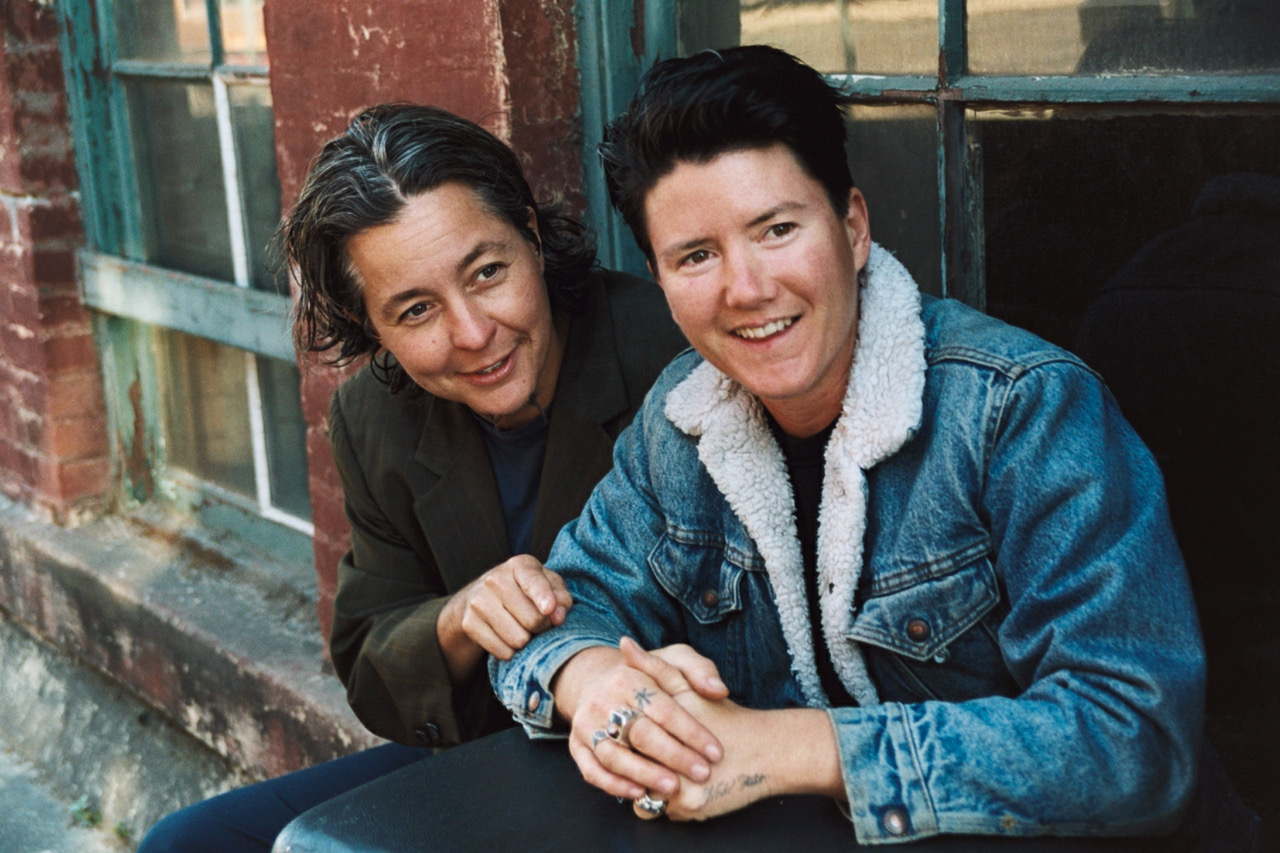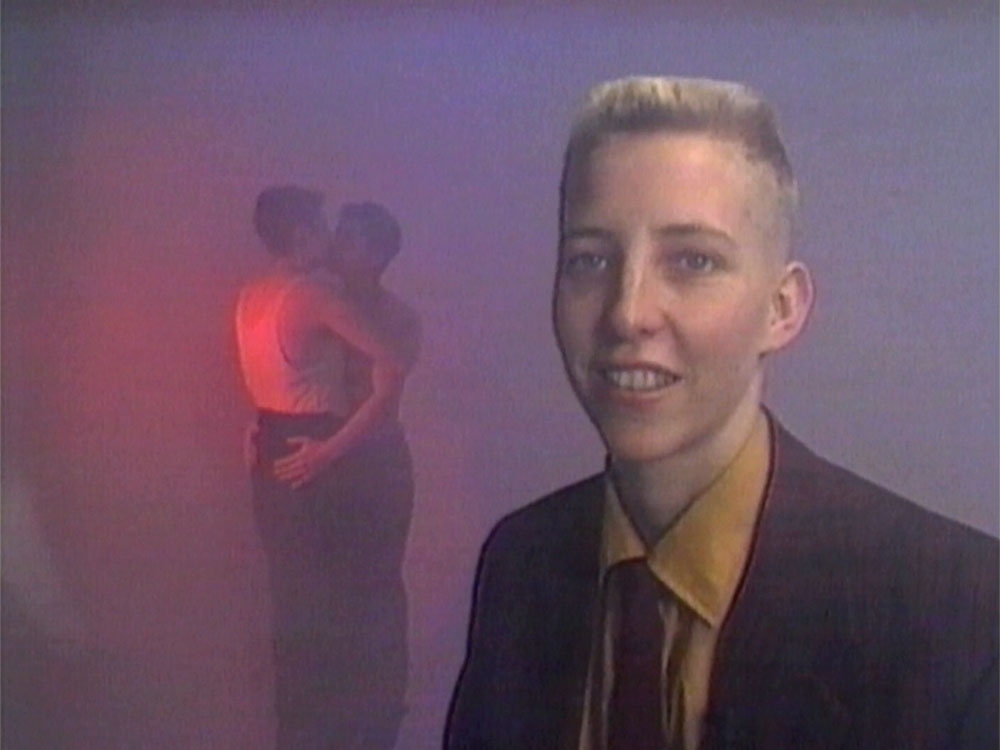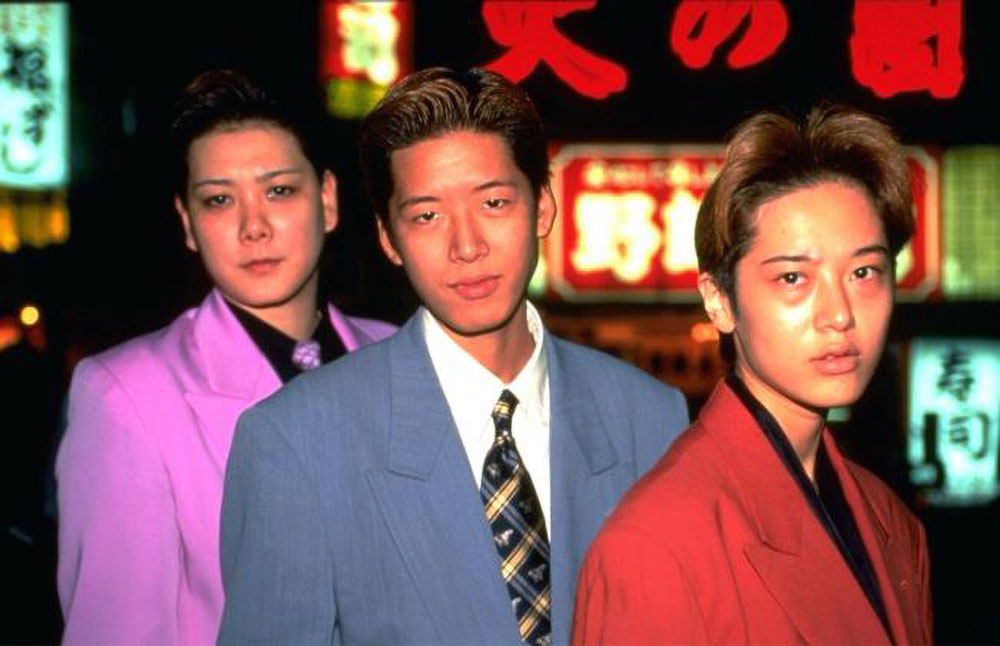While queer people have existed in cinema for the past hundred years, onscreen representation has rarely extended to trans men, butch dykes, and those who exist in the blurry area between identities. Originally envisioned as a streaming series for the Criterion Channel, critic/historian Caden Mark Gardner and filmmaker/historian Jenni Olson’s “Masc” is an essential survey that has since been brought to the UCLA Film and Television Archive and the Brooklyn Academy of Music. While each iteration of the series has featured a unique lineup, the series has featured a core mix of more recent films like Aisling Chin-Yee and Chase Joynt’s Billy Tipton documentary, No Ordinary Man (2020), canonical titles like Southern Comfort (2001), and a number of older works that have been rarely seen since their initial queer festival runs in the ’90s, like Susan Muska’s Stafford’s Story (1992).
“Masc” travels to BAMPFA beginning this Friday and running through the end of February. Each screening will be introduced by Olson, and most will feature Q&As with filmmakers, subjects, and academics. As I discovered in my conversation with Gardner and Olson, this latest iteration of the series will be like something of a homecoming, with nearly every film having a personal connection to the Bay Area. Our conversation has been edited for length and clarity.
Elizabeth Purchell: “Masc” began as a series for the Criterion Channel. How did that first come together?
Jenni Olson: The programmer at the Criterion Channel had asked me two years ago, when they did that retrospective of my work as a filmmaker, if I was interested in curating a series for the channel. I had been thinking about it for a while and then had this thought to do something like this. I had a few titles in mind, Caden had a few titles in mind, and we kind of threw them all in a bucket and debated and discussed—you know, here's my favorites, here's your favorites. We had many hours of meetings talking through what were the most important things.
Caden Gardner: It's been a long process, but it's been very gratifying to see more people be able to watch a lot of these films that have been in some ways hiding in plain sight for many years and have been worthy of rediscovery and reconsideration.
EP: What have been the differences between programming for streaming versus theatrical?
JO: Some of it is budget, and some of it is availability in the different formats and territories. So there are slight variations, although the core of things is the same.
CG: As far as theatrical, we were able to get a lot of the filmmakers and talent tied to those films [for in-person appearances], and that was really cool. Especially in a few cases where the filmmakers had not really had the opportunity to discuss [those works] in a theatrical setting, especially in light of the Covid lockdown.
JO: We are excited that we have special guests for pretty much all the screenings [in the BAMPFA series]—either the filmmakers or [other] conversants to put the films in context. The origin of this series is that it's so important for us to see ourselves on screen, and having public screenings–seeing ourselves on screen with ourselves, with our community, and seeing each other being in community–that's what it's all about.
EP: The series has already run on the Criterion Channel and in-person at UCLA and BAM. What has the reaction been?
JO: It's been amazing in different ways. This sense of the solidarity and common bonds of butch dykes and trans guys was the other thing about the construction of the series, so folks being together in community in that way was also really powerful in both New York and L.A.
CG: I was somewhere in Boston, and someone out in the wild recognized me and was like, Oh my god, thank you so much for the “Masc” series. But also watching people experience this in person is its own type of gratification and also seeing these sorts of dialogues and ideas about what stories on screen are now more broadly available and rethinking representations that are very multi-layered and multi-faceted—they aren't in these static categories. And I think that's what's also interesting about this series: we’re seeing, in many ways, people have these shifts, these ideas about themselves, these different definitions and changes over time.

EP: While the various iterations of the series have had a handful of narrative films, like By Hook or by Crook [2001] and Vera [1986], it seems like the focus has been more on documentary. Was this a deliberate choice or one that was just dictated by what was available?
CG: Due to availability and also the unspoken question of funding, especially in America, documentary nonfiction has often been a lifeline for telling trans stories. So that wasn’t necessarily a conscious choice, but what's interesting about these documentaries are some of them are the more traditional talking heads or the person talking about their life, but also a lot of these films are a sort of hybrid format. Especially No Ordinary Man, where the film is dealing with a sort of community commentary on how do we look back at the history of closeted, stealth trans experience and try to talk about that now and also do it in terms of reparative narrative—even though, again, this is still in more of a documentary format.
JO: No Ordinary Man is so amazing, and it is our opening night film for Berkeley. The way that it's both about Billy Tipton, but then opens up to be about the larger topic of transmasc history and experience, but in ways that are so much bigger and powerful and just so smart and thoughtful and innovative and joyful And the premise of having a fictional narrative—what would it be like to have a feature narrative about this subject? It's just such a great device to go into these things. As Caden’s saying, there’s obviously not enough feature narrative films [on these subjects], but to me one of the most significant is By Hook or by Crook because it's such a great San Francisco film and it's also so prescient in all of its gender stuff.
CG: I remember only a few years ago I felt like, Man, why isn't this in a Pride repertory series? And now it's really popping off. You can't find a trans- or queer-related repertory series without By Hook or by Crook, and it's very gratifying to see that film get the momentum that it's long deserved after it had its festival [premiere] over 20 years ago.
EP: Something else that's interesting to me about this series is that it's primarily made up of works that were shot on video, as opposed to film.
CG: I don't think it was a conscious choice, but something I thought about when I was doing my book research was how the democratization of video allowed for many narratives and also just regular documentation.
JO: It is interesting that so many titles are from the early 2000s. Southern Comfort and Lifetime Guarantee are both 2001, and then The Aggressives is 2005. And those are such quintessential I have my video camera, here we go, and they're so vibrant and dynamic and here we are.

EP: Another thing that I really like about this series is that it features a number of shorts, which don't get much play nowadays outside of festivals.
JO: The shorts program, at the other [venues], was the most popular other than the opening and closing night[s]. And there's some really exciting stuff: You’ve got old things that have not been seen and new things that also have not been seen that much. We have the animated short Pete [2022], which is on the Oscar shortlist for Animated Short, and which is also by Bay Area filmmakers who are based at Pixar. And then Monsieur Le Butch [2022] is the other recent film by Jude Dry that was at South by Southwest in 2022. And then Vàmanos [2015], which is such an amazing film with big stars in it, Vico Ortiz and Jessica Camacho, and directed by Marvin Lemus, whose new film is Alexander and the Terrible, Horrible, No Good, Very Bad Day. And then these great early ’90s shorts that have also really not been seen for a long time: Stafford's Story [1992], which is also a Bay Area film; Ifé [1993] by Lenn Keller, also a Bay Area film; Trans [1994] by Sophie Constantinou, also a Bay Area film. Oh, my short, Sometimes [1994], also a Bay Area filmmaker. And then Max [1992] by Monika Treut.
CG: Of the shorts, I would say Stafford's Story was the one I got the most feedback, because people were like, Wow, this is hot. And I'm like . . . Yeah, it is. As far as Max, sometimes we see these figures, especially in a trans documentary, that become recurring figures and images. And I think Max Wolf Valerio is a notable one. And he, since the ’90s, has been this persistent but very singular figure of expressing his trans masculinity and also his general thoughts on gender. And you can see in that short, especially, why he's been this very enduring figure on screen. It's such an important short.
JO: The other thing in that program is Adventures with Tony, which is this really amazing early 1960s home-movie footage of a butch on vacation. We always say that great line, “We have always been here,” and seeing that whole movie in particular is really powerful because you could just see her and be like, Oh my god, she looks like somebody who I could run into at the queer bar. Like, she's a really handsome butch, and this is like 60 years ago.
EP: Jenni, you were involved with Frameline in the early ’90s when a lot of these features and shorts were first premiering. How does it feel to be bringing them back out again all these years later?
JO: I programmed almost all of these films when I was co-director of Frameline in the early ’90s, so it does feel particularly sweet to be showing this at the PFA and bringing things back. Particularly Stafford's Story, which is from 1992. Stafford is going to be here, which is very exciting. Probably the most moving one is Ifé by Lenn Keller. Lenn was such an important person. She passed away a couple of years ago. She was the founder of the Bay Area Lesbian Archives. It's a great short, shot on 16mm film. I remember her coming to the Frameline office and giving me the VHS tape of it and being like, “Do you want to show this in the festival?”
EP: How has the audience reaction been compared to how they were received the first time around?
JO: That’s funny—can I remember? It's really powerful to see audiences experience these things, and particularly younger audiences. [There’s] this sense that this is history, but also like, Max particularly is so amazing. He's so candid and just bold and honest and like, this is what it's like. At the end of it, it has this thing where they put up the address of FTM International, and Max reads it in voiceover, and it’s an address in Oakland. And you just have this sense of this is more than 30 years ago, it’s going to be showing at gay film festivals and at places where the community is going to see it. And if you’re a trans guy in 1992, what are your resources? How are you finding out all of the things? You don’t have YouTube videos and the internet. And Max is like, Hi, I’m talking to you. That was really moving to me.
CG: Because this movie was coming out in the aftermath of the height of the AIDS crisis, you had this generation of activists and performers and people who wanted to find community. And it was very interesting seeing the uptick in these more DIY community newsletters, zines, and magazines like FTM International. And they were not just becoming these places of community, but they were also very aware and interested in broadcasting what was out there. This also dates back to how, in the ’80s, Lou Sullivan was organizing these movie nights of watching what little representation they had—something like What Sex Am I? [1985], or even just watching Vanessa Redgrave as Renée Richards Richards in a TV movie [Second Serve, 1986]. But you were seeing an awareness of thinking about representation and the importance of telling our stories, but also finding a sense of community and trying to to have these moments of outreach using film or even something like public-access television. I remember coming across an FTM International interview with Christopher Lee, who was a great trans filmmaker, [who] while noting the broader responsibility, also had his own ideas about art and representation. I thought [that] was incredibly very similar to Max Wolf Valerio putting himself out there.
JO: It’s such an amazing thing that we're doing this here at the PFA. Basically all these people that we're talking about, all this stuff, actually arises out of the Bay Area. Lou Sullivan for starters and FTM. You just referenced Christopher, but Loren Cameron, and Stafford, and Jamison Green, who’s in No Ordinary Man; so much of the FTM movement really originated here. It's a very powerful thing. It really is.
EP: I love those little almost confessional shorts like Max or Trans. Whenever I’ve programmed others like them, like Joseph Horning’s Valerie [1975] or Annette Kennerley’s Boys in the Backyard [1997], they always get a great response.
JO: It’s like we always talk about: we need to hear from people themselves telling their own stories. I mean . . . Southern Comfort [2001] and getting to know Robert Eads in this incredibly intimate and powerful way. It's such a moving film and I'm really excited that we're showing that. It's interesting, in certain ways, a lot of these films are like big films. Southern Comfort won the Grand Jury Prize at Sundance. But then they're also . . . I don't know, hidden, or hiding in plain sight or whatever, and we’re spotlighting them in this way. I think of The Aggressives [2005], that is following around these masc folks of color in New York City in the late ’90s and early 2000s, and then Shinjuku Boys [1995], similarly these AFAB [assigned female at birth] folks in Tokyo in the mid ’90s. I think that these are all also characterized by [the fact] that they're not exploitative.
CG: I think that when a trans film comes under fire, it often feels like it was exploitative in a way to have this sort of trade-off of humanity being on screen, but also still having the director dictate the terms of a film. Some [films in this series] are trans-authored, some are not, but I feel like the ones that are not are deeply respectful and deeply curious [about] the worlds that they are walking into and introducing. Even though it comes off a lot lighter than the rest of the movies in the series, I do think Lifetime Guarantee [2001] is a wonderful film. And it's full of complexity about gender roles and expectations and how this country is in many ways built on direct sales and the idea of the salesperson. And then you get Phranc, she's like this time bomb that goes off and completely upends this whole idea of so many norms. It's just great and fascinating to watch and feels so timely now.
EP: For people who come out to this series or who came out to the previous ones or who watched everything on the Criterion Channel and want more, what would be your recommendations for further studies?
JO: People should go follow Caden and Liz and me on Letterboxd. We all have really great lists. There are very clearly not enough movies, but there are a lot more that are available.
CG: My book—Corpses, Fools, and Monsters: An Examination of Trans Film Images in Cinema—comes out in July, and while I will not call it a definitive repository, there's stuff covered in the book that isn’t in the series for one reason or another.
“Masc: Trans Men, Butch Dykes, and Other Gender Nonconforming Heroes in Cinema” runs January 19–February 25 at BAMPFA.



